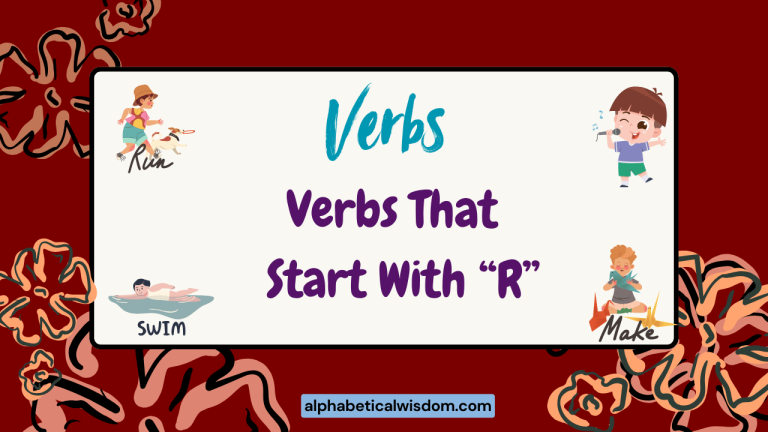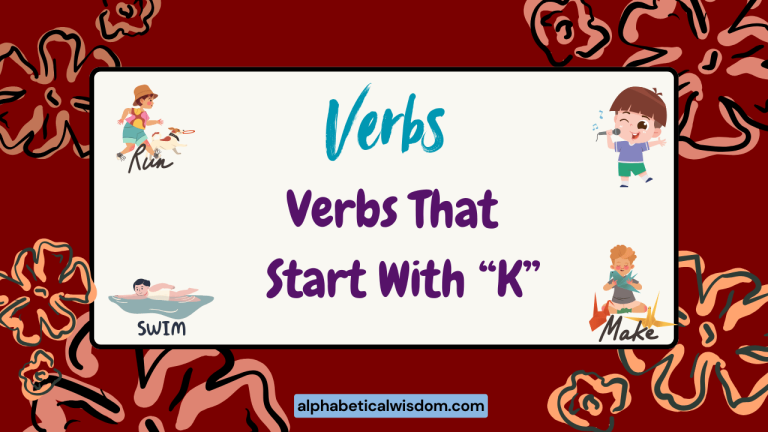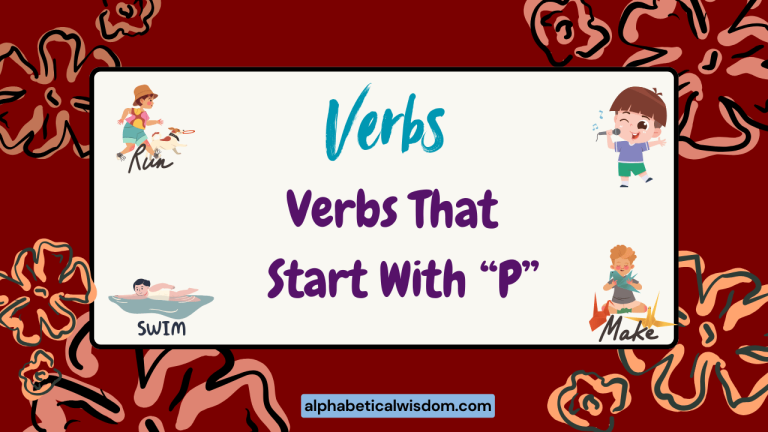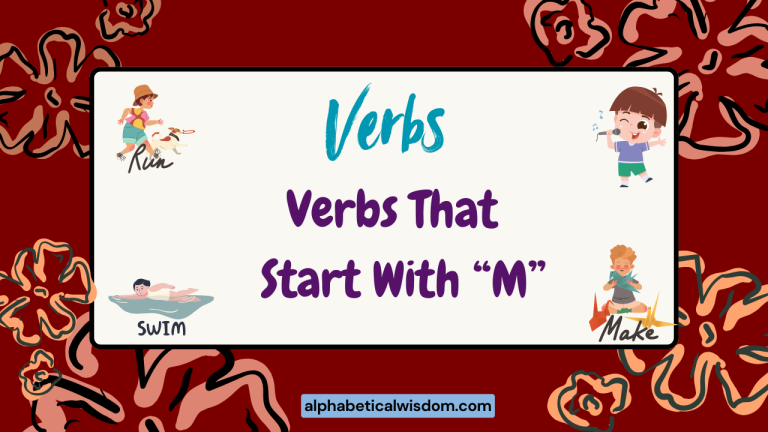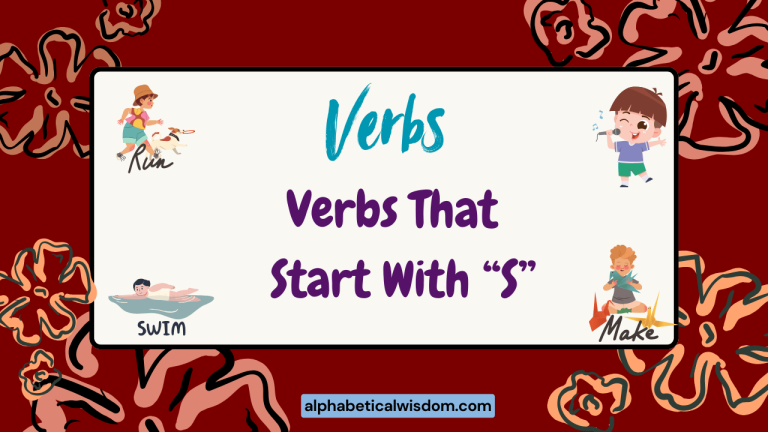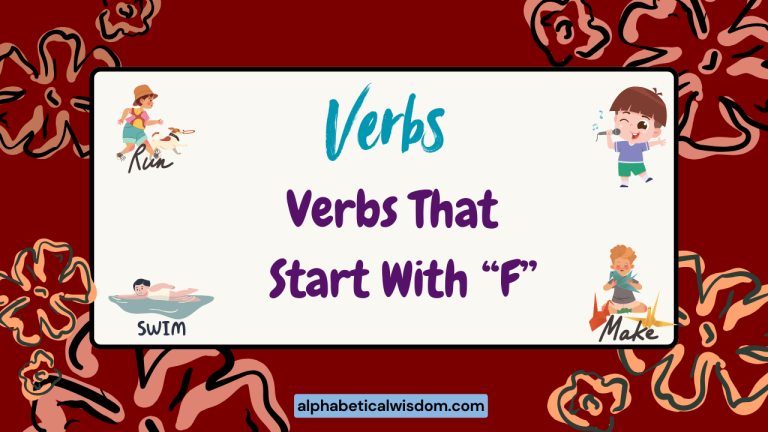Mastering Verbs That Start With O: A Comprehensive Guide
Verbs are the engines of sentences, driving action and connecting subjects to their states of being. Understanding the nuances of various verbs, especially those starting with a specific letter, can significantly enhance your English proficiency.
This article delves into the world of verbs beginning with the letter “O,” exploring their meanings, usage, and common pitfalls. Whether you are a beginner or an advanced learner, this guide will provide valuable insights and practical exercises to solidify your understanding and expand your vocabulary.
Table of Contents
- Introduction
- Definition of Verbs Starting with ‘O’
- Structural Breakdown of ‘O’ Verbs
- Types and Categories of ‘O’ Verbs
- Examples of Verbs Starting with ‘O’
- Usage Rules for Verbs Starting with ‘O’
- Common Mistakes with ‘O’ Verbs
- Practice Exercises
- Advanced Topics
- FAQ Section
- Conclusion
Definition of Verbs Starting with ‘O’
Verbs that start with the letter “O” are action words or states of being that, like all verbs, function as the core of a sentence’s predicate. These verbs encompass a wide range of meanings, from simple actions to complex processes and states.
They can be classified based on their function (action, linking, auxiliary), transitivity (transitive or intransitive), and form (regular or irregular). Understanding these classifications is crucial for using these verbs correctly and effectively.
The function of a verb starting with “O” is to describe what the subject of the sentence is doing, experiencing, or being. The context in which the verb is used determines its specific meaning and how it interacts with other elements of the sentence.
For example, “operate” can refer to performing surgery, managing a business, or controlling a machine, depending on the surrounding words.
Structural Breakdown of ‘O’ Verbs
The structure of verbs starting with ‘O’ is similar to that of other verbs in English. They can be conjugated into different tenses (present, past, future), aspects (simple, continuous, perfect, perfect continuous), and moods (indicative, imperative, subjunctive).
Regular verbs follow predictable patterns for forming past tense and past participle forms (usually by adding ‘-ed’), while irregular verbs have unique forms that must be memorized. The verb’s structure also influences its interaction with other sentence elements, such as subjects, objects, and adverbs.
Understanding the principal parts of a verb—base form, past simple, and past participle—is essential for correct usage. For instance, consider the verb “obey.” Its base form is ‘obey,’ its past simple is ‘obeyed,’ and its past participle is also ‘obeyed.’ However, for an irregular verb like “overcome,” the base form is ‘overcome,’ the past simple is ‘overcame,’ and the past participle is ‘overcome.’ Recognizing these patterns and irregularities is key to mastering ‘O’ verbs.
Types and Categories of ‘O’ Verbs
Verbs starting with “O,” like all verbs, can be categorized based on their transitivity and function within a sentence. These categories help in understanding how the verb interacts with other parts of the sentence and how it affects the overall meaning.
Transitive Verbs
Transitive verbs require a direct object to complete their meaning. The action of the verb is performed on the object. In other words, the verb “transits” its action to an object. For example, in the sentence “She opened the door,” “opened” is a transitive verb, and “the door” is the direct object.
Intransitive Verbs
Intransitive verbs do not require a direct object. The action of the verb is complete in itself and does not need to act upon something. For instance, in the sentence “He objects,” “objects” is an intransitive verb because it does not take a direct object.
Auxiliary Verbs
Auxiliary verbs, also known as helping verbs, assist the main verb in expressing tense, mood, or voice. While there are no primary auxiliary verbs that start with “O,” some verbs starting with “O” can function as part of a verb phrase that includes an auxiliary verb. For example, “They ought to obey the rules” uses “ought” in conjunction with “to obey.”
Phrasal Verbs
Phrasal verbs are combinations of a verb and a preposition or adverb (or both) that create a new meaning. The meaning of a phrasal verb is often different from the individual meanings of the verb and the particle. Examples include “opt out” (to choose not to participate) and “own up” (to confess). Phrasal verbs can be transitive or intransitive, depending on the specific combination.
Examples of Verbs Starting with ‘O’
Here are several examples of verbs that start with the letter “O,” categorized by their type and usage.
General Examples
This table provides a diverse range of examples of verbs starting with the letter “O,” showcasing their various meanings and forms.
| Verb | Definition | Example Sentence |
|---|---|---|
| Obey | To comply with or follow instructions. | The dog obeys his owner’s commands. |
| Object | To express disapproval or opposition. | I object to the proposed changes. |
| Observe | To watch carefully. | Scientists observe the behavior of animals. |
| Obtain | To get or acquire something. | She obtained a degree in engineering. |
| Occupy | To fill a space or time. | The soldiers occupy the territory. |
| Occur | To happen or take place. | The accident occurred yesterday. |
| Offer | To present something for acceptance or rejection. | He offered her a ride home. |
| Offset | To counteract or balance. | The gains offset the losses. |
| Omit | To leave out or exclude. | Please do not omit any details. |
| Open | To allow access or reveal. | She opened the window. |
| Operate | To control or use something. | The doctor operates on patients. |
| Oppose | To be against something. | Many people oppose the new law. |
| Opt | To choose or decide. | They opted for the blue car. |
| Organize | To arrange or structure. | She organized the files. |
| Originate | To begin or start. | The tradition originated in ancient times. |
| Overcome | To defeat or conquer. | He overcame his fears. |
| Overlook | To fail to notice or ignore. | They overlooked the mistake. |
| Overload | To put too much load on something. | The system overloaded with data. |
| Outdo | To surpass or excel. | He tried to outdo his previous performance. |
| Outline | To give a summary or main points. | The teacher outlined the lesson plan. |
| Output | To produce or generate. | The machine outputs data. |
| Outrun | To run faster than someone or something. | The athlete outran his competitors. |
| Outshine | To be more impressive or brighter than something else. | Her talent outshines all others. |
| Outsource | To contract work to an external company. | The company outsources its IT services. |
| Outsmart | To be cleverer than someone else. | He tried to outsmart the con artist. |
| Overeat | To eat too much. | I tend to overeat during the holidays. |
| Overfly | To fly over something. | Planes overfly the city regularly. |
Transitive Verb Examples
This table showcases examples of transitive verbs that start with the letter “O,” highlighting how they take a direct object to complete their meaning.
| Verb | Example Sentence | Direct Object |
|---|---|---|
| Obey | The soldiers obey the general’s orders. | the general’s orders |
| Observe | The scientist observes the experiment carefully. | the experiment |
| Obtain | She obtained a scholarship for her studies. | a scholarship |
| Occupy | The protesters occupied the building. | the building |
| Offer | He offered her a cup of coffee. | a cup of coffee |
| Open | She opened the door for him. | the door |
| Operate | The surgeon operates on the patient. | the patient |
| Organize | He organized the files in alphabetical order. | the files |
| Overcome | She overcame her fear of heights. | her fear of heights |
| Overlook | The editor overlooked a minor error in the manuscript. | a minor error |
| Output | The printer outputs high-quality images. | high-quality images |
| Outline | The professor outlined the main points of the lecture. | the main points |
| Outsmart | The detective outsmarted the criminal. | the criminal |
| Offset | The company’s profits offset the losses from the previous quarter. | the losses |
| Omit | The editor omitted the unnecessary details. | the unnecessary details |
| Outdo | The athlete outdid his previous record. | his previous record |
| Outshine | Her performance outshined all the others. | all the others |
| Outsource | The company outsources its customer service. | its customer service |
| Overload | The server overloaded the network. | the network |
| Oversee | The manager oversees the entire project. | the entire project |
| Overthrow | The rebels overthrew the government. | the government |
| Overturn | The court overturned the previous decision. | the previous decision |
| Own | She owns a beautiful house. | a beautiful house |
| Order | He ordered a pizza for dinner. | a pizza |
| Observe | I observe the stars every night. | the stars |
Intransitive Verb Examples
This table provides examples of intransitive verbs starting with the letter “O,” demonstrating how they do not require a direct object to complete their meaning.
| Verb | Example Sentence |
|---|---|
| Object | He objects to the proposal. |
| Occur | The event occurred last night. |
| Originate | The recipe originated in Italy. |
| Operate | The machine operates smoothly. |
| Opt | She decided to opt out of the competition. |
| Overreact | He tends to overreact in stressful situations. |
| Overstay | They did not want to overstay their welcome. |
| Ooze | The lava began to ooze from the volcano. |
| Orbit | The satellite orbits the Earth. |
| Overfly | The plane overflew. |
Phrasal Verb Examples
This table illustrates examples of phrasal verbs that start with the letter “O,” showcasing how the combination of a verb and a particle creates a new meaning.
| Phrasal Verb | Definition | Example Sentence |
|---|---|---|
| Opt out | To choose not to participate in something. | Many employees opted out of the health insurance plan. |
| Own up | To admit that you have done something wrong. | He finally owned up to breaking the vase. |
| Open up | To become more communicative or revealing. | She started to open up about her feelings. |
| Order around | To give orders in a domineering way. | The boss is always ordering his employees around. |
| Owe to | To be indebted to someone or something. | He owes his success to his hard work. |
| Outgrow | To grow too big for something. | The child outgrew his clothes. |
| Over with | Finished. | I am glad that exam is over with. |
Usage Rules for Verbs Starting with ‘O’
Using verbs correctly involves understanding several key rules related to tense, subject-verb agreement, and voice. Mastering these rules will ensure clarity and accuracy in your writing and speaking.
Tense Agreement
Tense agreement ensures that the verbs in a sentence or paragraph are consistent in time frame. If you start a sentence in the past tense, generally, you should continue in the past tense unless there is a logical reason to switch to another tense. For example: “She opened the door and saw a surprise.” Both verbs, “opened” and “saw,” are in the past tense.
Subject-Verb Agreement
Subject-verb agreement means that the verb must agree in number (singular or plural) with its subject. A singular subject takes a singular verb, and a plural subject takes a plural verb. For example: “He obeys the rules” (singular) versus “They obey the rules” (plural).
Active and Passive Voice
Voice refers to whether the subject of the sentence performs the action (active voice) or receives the action (passive voice). In the active voice, the subject is the actor: “She opened the door.” In the passive voice, the subject receives the action: “The door was opened by her.” Choosing between active and passive voice depends on the desired emphasis.
Common Mistakes with ‘O’ Verbs
Even experienced English learners can make mistakes with verbs. Here are some common errors to watch out for when using verbs starting with “O”:
| Incorrect | Correct | Explanation |
|---|---|---|
| He object to the plan. | He objects to the plan. | Subject-verb agreement: “He” is singular, so the verb should be “objects.” |
| She has overcame her fear. | She has overcome her fear. | Correct past participle form: The past participle of “overcome” is “overcome,” not “overcame.” |
| The accident was occur yesterday. | The accident occurred yesterday. | Correct tense and verb form: “Occur” needs to be in the past tense (“occurred”). |
| They opt out the program. | They opt out of the program. | Correct phrasal verb usage: The correct phrasal verb is “opt out of.” |
| I observe to him. | I observe him. | “Observe” is a transitive verb and doesn’t require “to” before the object. |
Practice Exercises
Test your understanding of verbs starting with “O” with these exercises.
Exercise 1: Fill in the Blanks
Fill in the blanks with the correct form of the verb in parentheses.
| Question | Answer |
|---|---|
| 1. She always ________ (obey) her parents. | 1. obeys |
| 2. They ________ (object) to the new rules. | 2. object |
| 3. The scientist ________ (observe) the stars carefully. | 3. observes |
| 4. He ________ (obtain) a new job last week. | 4. obtained |
| 5. The meeting ________ (occur) on Monday. | 5. occurred |
| 6. She ________ (offer) him a ride. | 6. offered |
| 7. Please ________ (omit) any unnecessary details. | 7. omit |
| 8. They ________ (open) the store at 9 AM. | 8. open |
| 9. The doctor ________ (operate) on the patient. | 9. operated |
| 10. We ________ (oppose) the war. | 10. oppose |
Exercise 2: Correct the Errors
Identify and correct the errors in the following sentences.
| Question | Answer |
|---|---|
| 1. He object for the decision. | 1. He objects to the decision. |
| 2. She has obtain a new car. | 2. She has obtained a new car. |
| 3. The accident was occur yesterday night. | 3. The accident occurred last night. |
| 4. They opt out the game. | 4. They opt out of the game. |
| 5. He has overcome from his illness. | 5. He has overcome his illness. |
| 6. I am obey my parents always. | 6. I always obey my parents. |
| 7. She offer me help. | 7. She offered me help. |
| 8. They are organize the event. | 8. They are organizing the event. |
| 9. He overlook the important detail. | 9. He overlooked the important detail. |
| 10. The machine operate good. | 10. The machine operates well. |
Exercise 3: Sentence Construction
Construct sentences using the given verbs starting with “O.”
| Verb | Example Sentence |
|---|---|
| 1. Obey | 1. Children should obey their parents. |
| 2. Object | 2. Many citizens object to the new tax laws. |
| 3. Observe | 3. Scientists observe the effects of climate change. |
| 4. Obtain | 4. Students must obtain good grades to succeed. |
| 5. Occur | 5. Earthquakes occur more frequently in certain regions. |
| 6. Offer | 6. Companies often offer discounts to attract customers. |
| 7. Omit | 7. Please omit any personal information from the public report. |
| 8. Open | 8. The museum opens at 10 AM every day. |
| 9. Operate | 9. Doctors operate to save lives. |
| 10. Oppose | 10. Many people oppose the construction of the new highway. |
Advanced Topics
For advanced learners, understanding the subjunctive mood and conditional sentences can further refine their use of verbs starting with ‘O’.
Subjunctive Mood
The subjunctive mood is used to express wishes, suggestions, or hypothetical situations. It often uses the base form of the verb, regardless of the subject. For example: “I suggest that he obey the rules.” The verb “obey” remains in its base form even though the subject is “he.”
Conditional Sentences
Conditional sentences express a condition and its result. They often use “if” clauses and can involve different tenses. For example: “If she overcomes her fear, she will travel the world.” This sentence uses the present simple in the “if” clause and the future simple in the main clause.
FAQ Section
Here are some frequently asked questions about verbs starting with “O”:
- What is the difference between “observe” and “observe to”?
- How do I know if a verb starting with “O” is transitive or intransitive?
- Can any verb starting with “O” be used in the passive voice?
- What are some common phrasal verbs starting with “O,” and what do they mean?
- How can I improve my understanding of verb tenses when using verbs starting with “O”?
- Is it correct to say “I am obeying”?
- When should I use “overcome” versus “overcame”?
- What is the best way to memorize irregular verbs starting with ‘O’?
- How can I avoid common mistakes with subject-verb agreement when using “O” verbs?
- Are there any regional differences in how verbs starting with “O” are used?
The verb “observe” typically takes a direct object without the preposition “to.” You “observe” something or someone directly. The phrase “observe to” is not standard usage; instead, use “observe” followed by the object you are watching or studying.
For example, “I observe the stars,” not “I observe to the stars.”
To determine if a verb is transitive or intransitive, check whether it takes a direct object. If the verb performs an action on an object, it is transitive.
If the verb does not need an object to complete its meaning, it is intransitive. For example, “She opened the door” (“opened” is transitive) versus “He objects” (“objects” is intransitive).
Only transitive verbs can be used in the passive voice because they have a direct object that can become the subject of the passive sentence. For example, “She opened the door” (active) can be transformed into “The door was opened by her” (passive).
Intransitive verbs cannot be used in the passive voice.
Common phrasal verbs starting with “O” include “opt out” (to choose not to participate), “own up” (to confess), and “open up” (to become more communicative). Phrasal verbs combine a verb with a preposition or adverb to create a new meaning.
Practice is key. Start by reviewing the basic verb tenses (present, past, future) and their forms.
Then, focus on using verbs starting with “O” in different tenses in sentences and paragraphs. Pay attention to tense agreement and subject-verb agreement.
Reading and listening to English content can also help you internalize the correct usage of verb tenses.
Yes, “I am obeying” is grammatically correct. It uses the present continuous tense, which describes an action that is ongoing at the moment of speaking.
For instance, “I am obeying my parents’ instructions right now because they asked me to.” This tense emphasizes the current, continuous nature of the action.
“Overcome” is the base form and the past participle of the verb, while “overcame” is the past simple form. Use “overcame” to describe a completed action in the past (e.g., “She overcame her fear”).
Use “overcome” as the past participle with auxiliary verbs like “has,” “have,” or “had” (e.g., “She has overcome her fear”).
Memorizing irregular verbs requires consistent effort and various techniques. Create flashcards with the base form, past simple, and past participle of each verb.
Use the verbs in sentences to understand their usage in context. Practice regularly and review frequently to reinforce your memory.
Online resources and apps can also provide interactive exercises to help you learn irregular verbs.
To avoid subject-verb agreement errors, always identify the subject of the sentence clearly. Determine whether the subject is singular or plural, and then ensure that the verb agrees in number.
For example, “He obeys” (singular) versus “They obey” (plural). Pay special attention to collective nouns and indefinite pronouns, which can sometimes be tricky.
While the core meanings of verbs starting with “O” remain consistent across different English-speaking regions, there might be slight variations in usage or colloquial expressions. Pay attention to the context and be aware of regional dialects when encountering unfamiliar usages.
Consulting regional dictionaries or style guides can also be helpful.
Conclusion
Mastering verbs starting with the letter “O” is a crucial step in enhancing your English language skills. Understanding their types, usage rules, and common pitfalls will enable you to communicate more effectively and accurately.
By studying the examples provided, completing the practice exercises, and reviewing the FAQs, you can solidify your knowledge and expand your vocabulary. Remember that consistent practice and attention to detail are key to achieving fluency and confidence in using these verbs.
Continue to explore and practice using verbs that start with “O” in various contexts. Read widely, listen attentively, and don’t hesitate to ask questions when you encounter unfamiliar usages.
With dedication and perseverance, you can master the nuances of these verbs and elevate your overall command of the English language.

